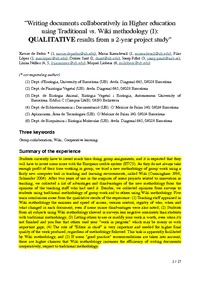 Diese Seite wurde seit 4 Jahren inhaltlich nicht mehr aktualisiert.
Unter Umständen ist sie nicht mehr aktuell.
Diese Seite wurde seit 4 Jahren inhaltlich nicht mehr aktualisiert.
Unter Umständen ist sie nicht mehr aktuell.
 Zusammenfassungen
Zusammenfassungen
Students currently have to invest much time doing group assignments, and it is expected that they
will have to invest some more with the European credits system (ETCS). As they do not always take
enough profit of their time working in group, we tried a new methodology of group work using a
fairly new computer tool in teaching and learning environments, called Wiki (Cunningham 1998,
Schneider 2004). After two years of use in the auspices of some projects related to innovation in
teaching, we collected a list of advantages and disadvantages of the new methodology from the
opinions of the teaching staff who had used it. Besides, we collected opinions from surveys to
students using traditional methodology of group work and to others using Wiki methodology. Five
main conclusions arose from the qualitative results of the experience:
Von Xavier de Pedro Puente, Maria Rieradevall, Pilar López, Dolors Sant, Josep Piñol, Lluïsa Núñez, Miquel Llobera im Text Writing documents collaboratively in Higher education using Traditional vs. Wiki methodology (2006) - Teaching staff appraised in Wiki methodology the easiness and speed of access, version control, registry of who, when and what changed in each document, even if some minor disadvantages were also noted;
- Students from all subjects using Wiki methodology showed in surveys less negative comments than students with traditional methodology;
- Letting others to see or modify your work is worth, even when it's not finished and you fear that others read your "work in progress" which may be messy or with important gaps;
- The role of "Editor in chief" is very important and needed for higher final quality of the work produced, regardless of methodology followed. This task is apparently facilitated by Wiki methodology; and
- If some "good practice" recommendations are taken into account, there are higher chances that Wiki methodology increases the efficiency of writing documents cooperatively, respect to traditional methodology.
 Dieser Text erwähnt ...
Dieser Text erwähnt ...
 Personen KB IB clear | Miquel Llobera , Pilar López , Lluïsa Núñez , Xavier de Pedro Puente , Josep Piñol , Maria Rieradevall , Dolors Sant , Daniel Schneider | ||||||||||||||||||||||||||||||||||||
 Aussagen KB IB clear | Kollaboratives Schreiben kann Lernen förderncollaborative writing can facilitate learning | ||||||||||||||||||||||||||||||||||||
 Begriffe KB IB clear | Blended LearningBlended Learning
, Bologna-Reform
,  E-Mail E-Mail e-mail
, e-mail
,  Kollaboratives Schreiben Kollaboratives Schreiben collaborative writing
, collaborative writing
,  RSS RSS Really Simple Syndication
, Schreibenwriting
, Really Simple Syndication
, Schreibenwriting
,  Schreiben am Computer Schreiben am Computer writing with a computer
, TikiWiki
, Versionsverwaltungrevision control
, Wikiwiki
, Wiki in educationWiki in education writing with a computer
, TikiWiki
, Versionsverwaltungrevision control
, Wikiwiki
, Wiki in educationWiki in education
| ||||||||||||||||||||||||||||||||||||
 Texte |
|
 Dieser Text erwähnt vermutlich nicht ...
Dieser Text erwähnt vermutlich nicht ... 
 Nicht erwähnte Begriffe | Schreiben von Hand, Weblogs |
 Tagcloud
Tagcloud
 Zitationsgraph
Zitationsgraph
 Zitationsgraph (Beta-Test mit vis.js)
Zitationsgraph (Beta-Test mit vis.js)
 2 Erwähnungen
2 Erwähnungen 
- Writing documents collaboratively in Higher education (II) - Quantitative results from a 2-year project study (Xavier de Pedro Puente, Maria Rieradevall, Pilar López, Dolors Sant, Josep Piñol, Lluïsa Núñez, Miquel Llobera) (2006)


- WikiSym 2007 (2007)
 Volltext dieses Dokuments
Volltext dieses Dokuments
 |  Writing documents collaboratively in Higher education (I)
using Traditional vs. Wiki methodology: Artikel als Volltext ( Writing documents collaboratively in Higher education (I)
using Traditional vs. Wiki methodology: Artikel als Volltext ( : :  , 621 kByte; , 621 kByte;  : :  2021-03-20) 2021-03-20) |
 Anderswo suchen
Anderswo suchen 
 Beat und dieser Text
Beat und dieser Text
Beat war Co-Leiter des ICT-Kompetenzzentrums TOP während er Dieser Text ins Biblionetz aufgenommen hat. Die bisher letzte Bearbeitung erfolgte während seiner Zeit am Institut für Medien und Schule. Beat besitzt kein physisches, aber ein digitales Exemplar. Eine digitale Version ist auf dem Internet verfügbar (s.o.). Es gibt bisher nur wenige Objekte im Biblionetz, die dieses Werk zitieren.








 Biblionetz-History
Biblionetz-History